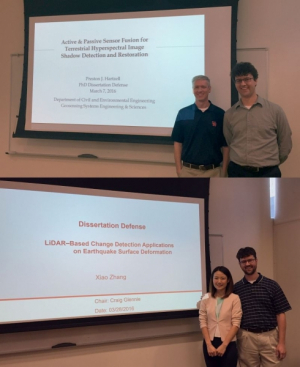Two students from the Geosensing Systems Engineering & Sciences (GSES) graduate program recently defended their Ph.D. dissertations. Preston Hartzell defended on, "Active and Passive Sensor Fusion for Terrestrial Hyperspectral Image Shadow Detection and Restoration." The dissertation broke new ground in the application of radiometrically calibrated laser scanning intensity for enhancing existing and new shadow restoration techniques within fused hyperspectral imagery. The developed techniques demonstrated sub-pixel image shadow detection and enabled accurate recovery of spectral information within shadowed areas for improved image classification results. The work extends the value of terrestrial laser scanning information in sensor fusion applications beyond the currently employed spatial dimension into the spectral domain.
Xiao Zhang defended on, "Lidar Based Change Detection for Earthquake Surface Ruptures." Significant damage due to earthquakes, coupled with poor comprehension of the mechanism of earthquake surface ruptures, requires the ability to rapidly characterize 3D deformation over large areas to study stress change on faults and after-slip activity. Earlier studies showed the potential of obtaining displacement fields by differencing repeat lidar scans; however, the overall methodology has not received sufficient attention, and optimal methods of estimating 3D displacement from airborne laser scanning were needed. In Xiao's dissertation, a new solution, the Anisotropic Iterative Closest Point (A-ICP) algorithm, and a new partition scheme known as a “moving window,” with the innovate use of anthropogenic features, were proposed to handle the large spatial scale point cloud coverage and to deliver local, varying surface deformation near the fault, while overcoming the difficulties associated with sparse legacy pre-event datasets.
Preston has accepted a position as a Research Assistant Professor in the GSES program, at the University of Houston, where he will be continuing his work in sensor fusion and error modeling. Xiao will be working for the Shell Exploration and Production Company, in Houston, TX, as a Geomatics Specialist. Dr. Craig Glennie was advisor to both students.
Congratulations, Preston and Xiao!


